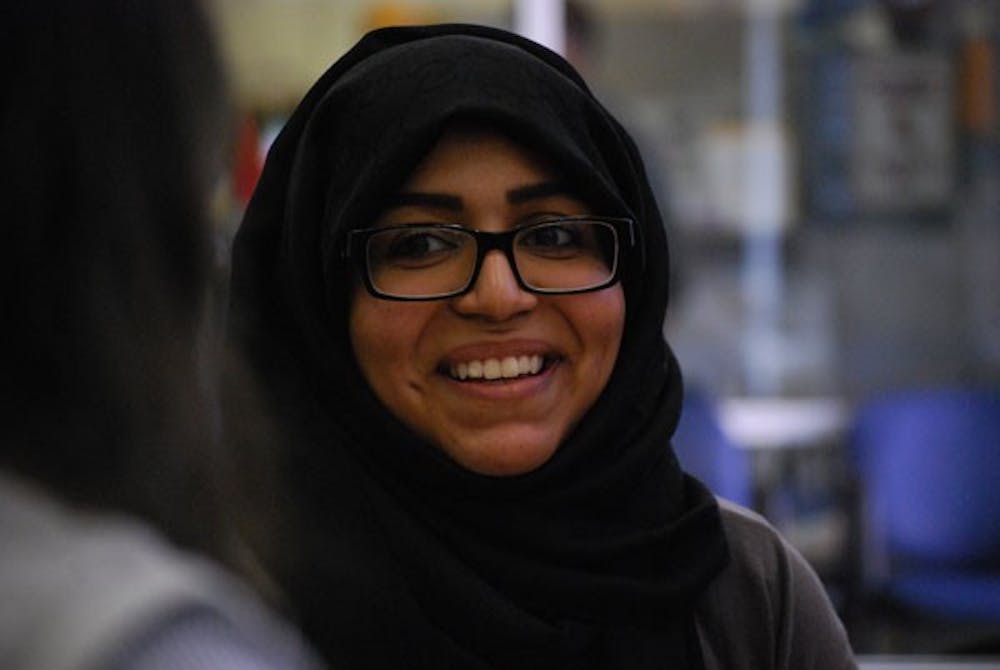 Supply chain management junior Zahraa Altarouty speaks about her traditions in Saudi Arabia. Altarouty is an international student. (Photo by Murphy Bannerman)
Supply chain management junior Zahraa Altarouty speaks about her traditions in Saudi Arabia. Altarouty is an international student. (Photo by Murphy Bannerman)Many ASU students are preparing to celebrate American holiday traditions with their families, but for international students, it may be a different story.
Supply chain management junior Zahraa Altarouty, who will spend her break in Saudi Arabia, said she is excited to go home.
“When I go back home, I miss (the U.S.) terribly,” she said. “But when I’m here, I miss back home.”
Altarouty said she has to adjust to cultural differences when she returns home each summer and winter break.
“There (in Saudi Arabia), I have to ask my father for permission to go out,” Altarouty said. “I have to wear an abaya.”
Abayas are long cloaks women wear in public in some Islamic countries.
Every time she comes back to her life at ASU, she experiences a reverse culture shock, she said.
In America, Altarouty wears non-traditional clothes and a scarf over her hair.
There are things she does here that are the same as what she would do back home, Altarouty said.
“I don’t drink. … I still wear my scarf,” she said. “I don’t get to stay out late.”
This year, no holidays coincide with the time she will spend in Saudi Arabia, Altarouty said.
“Muharram and Safar are very religious months,” she said.
They are the first two months of the Arabic year, and Altarouty observed them by wearing only black for 10 days in November.
Being at ASU has been a positive experience, Altarouty said.
“I got to discover new things about myself,” she said.
Industrial engineering junior Mohammad Rashed will arrive in Kuwait, his homeland, on Dec. 25. He will only spend 10 days there.
“I didn’t want to go, but my mom insisted,” he said.
Rashed will be home to experience Kuwait’s camping season. The season begins in December and ends in April.
“It’s basically when the weather gets nice,” he said. “I’m going camping with my friends.”
It will be difficult to adjust being there for 10 days and then come back to America, Rashed said.
When he goes to Kuwait, Rashed shaves his head and grows a beard. He wears traditional clothing for special occasions.
Studying in the U.S. has changed Rashed’s life, he said.
“It’s a new world. It’s a new experience,” he said.
The most important thing to maintain while he studies in America is his religion, Rashed said.
“I pray and celebrate Eid and Ramadan,” he said.
Rashed said he is open to experiencing western traditions.
Last year, he counted down the seconds on New Year’s Eve at Mill Avenue and celebrated Independence Day on July 4.
“It was fun, all the people coming together to celebrate,” he said. “I like Western holidays. They’re cool.”
Electrical engineering freshman Chris Nyarwaya will not visit his home in Rwanda during winter break.
Nyarwaya goes to church every year to celebrate Christmas and then attends a family reunion.
“It’s a big day back home,” he said. “Even the people that don’t go to church all year long go that day.”
This year, Nyarwaya will pray at home but will not celebrate otherwise.
There are big differences between Christmas in Rwanda and in America, Nyarwaya said.
“In Rwanda, it’s completely religious,” he said. “Here, it seems to be more of a cultural thing.”
Nyarwaya’s family does not exchange gifts during their Christmas celebration. It is difficult to understand the differences between the holidays, even if they are the same one, Nyarwaya said.
“People here get too much into the tree, the decorations and Santa,” he said. “It’s very different than what I’m used to.”
Reach the reporter at dpbaltaz@asu.edu or follow her on Twitter @dpalomabp




